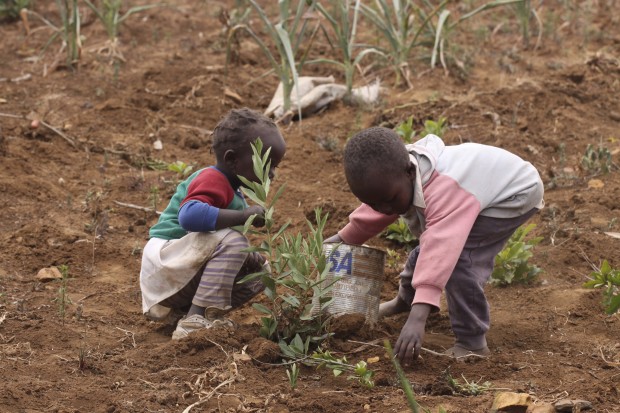Africa being left out of climate aid—development bank

In this Monday, Aug. 17, 2009 file photo, children salvage the remains of a failed potato field at a farm in the Laikipia District, of Kenya, some 200 kilometers (120 miles) north of the capital Nairobi, in the wake of a prolonged drought which wiped out harvests throughout the country. INQUIRER file photo
LIMA, Peru—The head of the African Development Bank says the continent is not getting enough of the billions of dollars in climate change funding, despite being the region that suffers most.
With clutch climate talks approaching in December, world leaders are scrambling to come up with pledges toward the target of $100 billion a year by 2020 to fight global warming—a make-or-break promise in the arduous negotiations to reach a comprehensive deal on cutting carbon emissions.
But the development bank’s president, Akinwumi Adesina, said the world needs to rethink how it spends that money.
“Africa today contributes just two percent of all greenhouse gas emissions, but Africa is the one that suffers most from the impact of climate change,” Adesina told AFP on the sidelines of the International Monetary Fund and World Bank annual meetings in Lima, Peru.
The talks marked the 55-year-old Nigerian’s first major world event since taking up his post in September.
Article continues after this advertisement“We need to look at how we’re dividing up (climate funding) to make sure the financing levels are high enough,” said Adesina, a former agriculture minister who was named Forbes magazine’s “African of the Year” in 2013.
Article continues after this advertisementAfrica, he said, is not getting its fair share of climate funds—which last year stood around $62 billion from governments, multilateral institutions and the private sector, according to a recent study.
The problem, he said, is the way climate funding is allocated.
The money, both loans and grants, goes to fund two kinds of projects: mitigation and adaptation.
Mitigation means cutting carbon emissions. Adaptation means preparing for the extreme weather events and natural disasters that will be caused by rising global temperatures.
“What Africa needs is funds for adapting. We have hundred of millions of people who have no way of adapting to climate change,” said Adesina.
“But unfortunately, on climate finance, today in the world… 76 percent of financing is dedicated to mitigation.
“This is an imbalance that needs to be addressed.”
Smallest polluter, biggest victim
The world’s poorest continent is also its lowest polluter, because it has relatively few of the industries, power plants and vehicles that contribute most to carbon emissions.
But most climate funding “tends to favor Asian countries like India and China,” said Adesina.
His own institution plans to triple investment in climate-related projects to more than $5 billion a year by 2020, which will represent 40 percent of its total portfolio.
That will put it on par with the European Bank for Reconstruction and Development for the title of greenest bank in the world.
French Finance Minister Michel Sapin, whose country will host the upcoming climate talks known as COP21, has called Adesina “very determined” on climate change.
Adesina in turn had a message for Sapin as he races to reach the magic number of $100 billion in climate funds.
“COP21 needs to be a great success, but in order for it to be a great success it’s very important to be able to access the needed financing for both adaptation and mitigation—but first of all adaptation,” he said.
RELATED STORIES
Vulnerable nations launch ‘V20′ to fight climate change
PH, other vulnerable countries propose 10-pt climate action plan in Asia